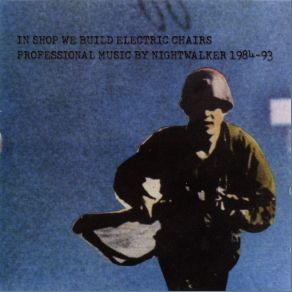Professional Music By Nightwalker
Download links and information about Professional Music By Nightwalker by Nightwalker. This album was released in 1999 and it belongs to Rock, Indie Rock, Alternative, Psychedelic genres. It contains 11 tracks with total duration of 32:45 minutes.

|
|
|---|---|
| Artist: | Nightwalker |
| Release date: | 1999 |
| Genre: | Rock, Indie Rock, Alternative, Psychedelic |
| Tracks: | 11 |
| Duration: | 32:45 |
| Buy it NOW at: | |
| Buy on iTunes $9.99 | |
| Buy on Amazon $9.49 | |
Tracks
[Edit]| No. | Title | Length |
|---|---|---|
| 1. | Drum Solo | 0:54 |
| 2. | The Fink Swan (Swims Away) | 2:45 |
| 3. | Kenneth Ray | 2:54 |
| 4. | Dogwood Grains | 1:07 |
| 5. | Amazed | 2:23 |
| 6. | Signifying UFO | 0:19 |
| 7. | Ceramic Cock Einstein | 6:16 |
| 8. | U235 | 0:25 |
| 9. | Weird Rivers and Sapphire Sun | 2:54 |
| 10. | Trashed Canned Dogs | 1:40 |
| 11. | Those Little Bastards Will Bite | 11:08 |
Details
[Edit]Nightwalker's identity is locked away like state secrets (they are supposedly from Bloomington, Indiana), but if that voice sneering out from beneath the cacophony of "The Fink Swan (Swims Away)" and "Amazed" is not Robert Pollard, I'm not convinced the man exists. In Shop We Build Electric Chairs is like a mock-greatest hits collection or compilation covering a nine-year existence. Whether or not that holds water is anyone's guess, but none of the songs here could be mistaken for commercial "hits." Opening with a minute-long drum solo, the album then squeezes together lo-fi, no-wave, art-rock, acid psyche, raga ("The Fink Swan"), extended free-form ambient collages ("Ceramic Cock Einstein," "Those Little Bastards Will Bite"), and Native American-like augury chant ("Weird Rivers & Sapphire Sun") over the subsequent thirty minutes. This is pop that is distinctly anti-pop, aggressive, deconstructionist music. The music cannot be mistaken for easy listening; it is, instead, disorienting experimental music at its most paranoid and demented that doesn't pretend to be accessible, dada-pop/rock with strains of usually vocal melodies breaking through the shards of noise-drone-y electric guitars, drums keeping awkward, lethargic beats, various electronic bleeps. Nevertheless, certain of the vocal melodies can't help but sneak they're way into your heart, from the sad and pretty "Dogwood Grains" (which also manages to be eerie, with barely audible voices heard in the background) to the dirge-like progressions of "Amazed." The rest is fascinating, if difficult, listening. Perhaps the most befuddling of all aspects about In Shop We Build Electric Chairs is that occasionally another voice that is not Pollard's reaches the surface of the songs. Just when you think you have a grasp on the music, maybe even an insight into the band, the center falls out.